
79 minute read
Administration
moSES organic Field Days
Field days give farmers the chance to learn the latest ideas about specific farming topics. At the same time, farmers, who often work alone, can connect with each other, share ideas and get support. In 2012, we organized 12 field days on organic farms in Iowa, Illinois, Wisconsin, and Minnesota. Some of these events we did in tandem with other organizations to make the best use of resources. Each event offered a tour of a successful organic farm to illustrate best practices in a specialty, a presentation by the farmer and a local specialist such as a veterinarian or researcher, and a question-and-answer session. At these field days and at tradeshows MOSES attends, farmers can confer with our organic specialists and pick up information to support their operations.
Farmers also take advantage of the wealth of information accessible on our website. This year, we added an Online Organic Classifieds section to give farmers a central place to look for farm supplies, jobs, and farm land. Our website experienced 2,367,563 total hits in 2012, demonstrating its worth as a go-to source for information about organic and sustainable farming practices and events.
245,703
individuals accessed information about organic and sustainable farming on the MOSES website.
Aaron Butler talks about the value of large-scale organic production to the 80+ farmers who went to our Organic Field Day in September on the Butlers’ 1600-acre organic farm near Malta, Ill.


More than new farmers 70 attended our Beginning Livestock training in July, telling us: “this is just what we needed!”

Inspire
In order to create a world where all agriculture is organic and sustainable, we must inspire more farmers to engage in organic production. MOSES manages several programs that help conventional farmers transition to organic, and encourage new farmers to grow and succeed.
Through our Farmer-to-Farmer Mentoring Program, experienced organic farmers pass on the art and science of farming to those new to the field. Both groups find the relationships beneficial. As a mentor in our 2012 program said, “The mentees were very active and engaged, and asked questions in ways that required me to rethink some practices— it was an unanticipated bonus!” A total of 50 participants from Iowa, Illinois, Minnesota, Missouri and
Wisconsin took part in 2012, a 19% increase from the previous year. One reason for this increase is that we provided mentors to farmers in the
Spring Rose Cooperative in Wisconsin and the Land Stewardship Project in Minnesota—this combination of services gives people who are new to farming a stable foundation for success. New farmers also find encouragement and training through our
New Organic Stewards program, which we operate in partnership with Renewing the Countryside. We introduced the program at the 2012 MOSES Conference with a special track of workshops, two pre-conference Organic University™ courses, and several social activities. More than 175 conference participants identified themselves as “Young Organic Stewards”—we broadened the program’s focus later in the year by changing the name from “Young” to “New.” We awarded over 65 conference scholarships valued at more than $11,000 to new farmers.
Empow E r
To empower farmers to thrive in a sustainable system of agriculture, we must give them the information they need to succeed in the field, and nurture an environment that supports sustainable and organic production. We do that by helping to create supportive farm policies, by providing networking opportunities for farmers, and by cultivating a public that appreciates and demands organic. In 2012, much of our policy work centered on the once-every-fiveyears farm bill. MOSES and our partners in the National Organic Coalition and the National Sustainable Agriculture Coalition worked hard to ensure that the various versions of the farm bill supported organic and sustainable farming practices—and we will continue to encourage passage of a conservation-minded farm bill in 2013.
This past spring, we created a set of myth-busting fact sheets: Organic Farming CAN Feed the World, The Facts about Organic Agriculture, and, What You Should be Saying about Organic Farming—a topic ACRES-usa featured in their July publication. We also created a new edition of our popular Guidebook for Organic Certification this past year.
MOSES Rural Women’s Project, which champions women working to change the food system, produced three “In Her Boots” on-farm workshops, partnered with the Women, Food & Agriculture Network on four conservation workshops, and presented at farm fairs, including the Mother Earth News Fair in Washington state.
Over the past year, we ramped up our conversation with farmers and the general public through social media, and were gratified to see the number of our Facebook fans grow by more than 60%.
Farmers downloaded Organic Fact Sheets from our website in 2012. We added five new topics to our list, for a total of 31 titles.
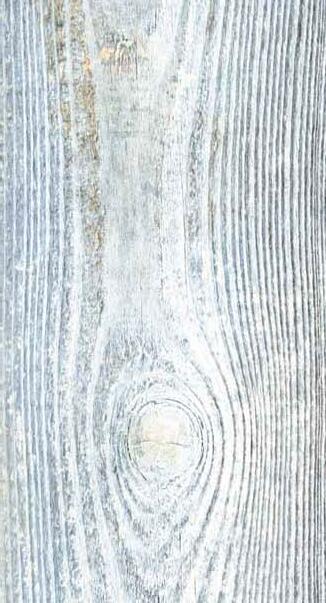
106,010
In the past year, farmers accessed our Gudebook for Organic Certification online nearly 25,000 times, and picked up thousands of print copies at events.
Financial Information for MOSES Fiscal Year*
Financials reported are from audited statements based on generally accepted accounting principles for non-profits, which record assets raised for future years in the year received.
Income Allocation:
Conference $622,616 Grow Organic Programs 567,687 Operating Support 140,988 Special Projects 113,188 Sales/Goods Sold 66,314 In-Kind Contributions 63,415 Miscellaneous 10,196 Total Income $1,584,404
Expenses:
Conference $ 530,128 Grow Organic Programs 364,098 Management and General 138,886 Special Projects 103,833 Cost of Goods Sold 75,765 Fundraising Expenses 87,576 In-Kind Contributions 63,415 Networking 46,546 Total Expenses $1,410,247 Assets: Operating and Designated Funds $413,701 Board-Designated Reserve Allocations $168,974 Temporarily Restricted $296,686 Total Net Assets $879,361
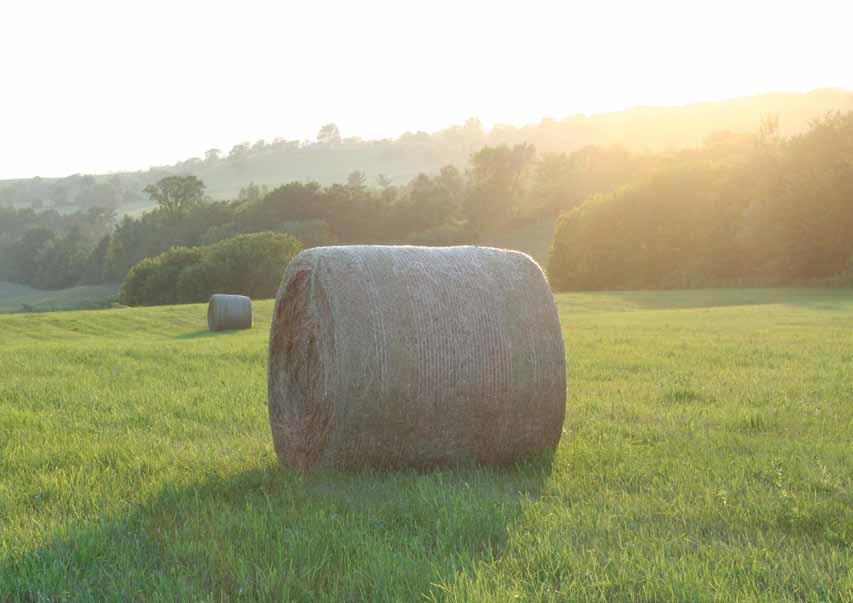
* Numbers reflect the MOSES fiscal year of Sept. 1, 2011 to Aug. 31, 2012.
MOSES Supporters
We are fortunate that many wonderful foundations, businesses and agencies share our commitment to changing the way America farms. Their generous donations to MOSES ensure that we can continue to cultivate organic and sustainable farmers by providing training, resources, advice and encouragement. On behalf of the many farmers who depend on us, we extend heartfelt thanks to these major funders: Albers/Kuhn Family Foundation Annie’s, Inc. Brico Fund Blooming prairie Foundation Ceres Foundation Clif Bar Family Foundation Farm Aid Frontier Natural products Co-op mcKnight Foundation Newman’s own Foundation organic Valley/Cropp Stonyfield Farms UNFI Foundation USDA – Beginning Farmer and Rancher Development Risk Management whole Foods market wisconsin Farmer’s Union

moSES organic Farming Conference Sponsors Dozens of sponsors contribute to the success of the MOSES Conference— it’s truly a nationwide event for the organic community. See the full list of conference sponsors on our website at mosesorganic.org/ofc_sponsors.

Grassroots Support Hundreds of individuals also voice their support of organic and sustainable production by donating to MOSES. The generosity of these funders makes it possible for us to educate, inspire and empower farmers to succeed in organic, sustainable agriculture.
Funding Sources
Fiscal Year 9/11-8/12
Donations 6%
Government Grants/ Agreements 17% Sales 4%
miscellaneous 1%
Foundation Grants 33% Earned Income 39%
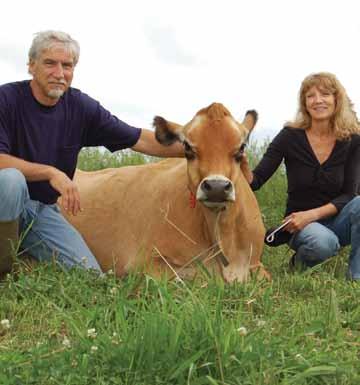
Francis and Susan Thicke raise Jersey cows and produce organic dairy products on their farm in Fairfield, Iowa. They are the 2012 MOSES Organic Farmers of the Year.
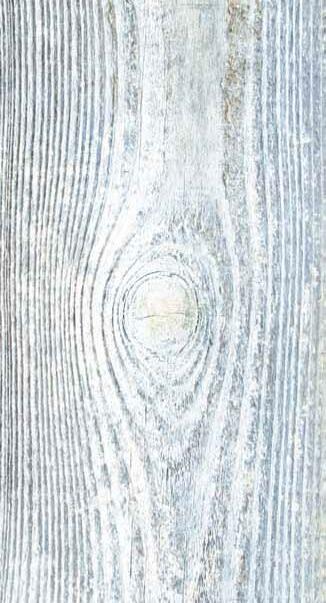
2012 MOSES Organic Farmer of the Year
Francis and Susan Thicke took a worn-out, heavily eroded crop farm and transformed it into a showcase for organic, sustainable land management. Their outstanding land stewardship, farming innovations and outreach efforts earned them the title of 2012 Farmers of the Year, an award they received at the 2012 MOSES Conference in February. Using sound science and keen intuition, the Thickes raise a herd of 80 Jerseys and grow organic crops on their farm, Radiance Dairy in Fairfield, Iowa. They keep their cows out on pasture April through December. Their crop rotation includes hay and small grains to minimize weed pressure—usually, they only need to cultivate once per season to keep their soybean crop clean. Among their conservation-minded land management strategies are windbreaks of fruiting trees and shrubs for wildlife habitat. Value-added products are key to the farm’s profitability. Radiance Dairy organic products include milk, yogurt, several cheeses, and soft-serve ice cream mix for restaurants. They market the farm’s products within four miles of their fields, doubling the benefits of organic by providing a locally grown, locally made product. Francis and Susan educate other farmers by example, by teaching at events and by participating in political activities. We appreciate their advocacy efforts, which lead to increased local, regional and national public support for organic agriculture.
See our website to submit a nomination for MOSES Farmer of the Year: www.mosesorganic.org/foy.html.
PO Box 339, Spring Valley, WI 54767 715-778-5775 www.mosesorganic.org

Training, resources and expertise to help farmers grow organic successfully:
Organic Specialists
On-call help from experienced organic specialists
MOSES Organic Farming Conference & Organic University™
Country’s largest conference and tradeshow on organic, sustainable agriculture
Organic Field Days and Trainings
On-farm events with latest ideas, tools and research
Organic Broadcaster & Organic Link
News for the organic community
Guidebook for Organic Certification
36-page book on certification process and rules
Organic Fact Sheets
Easy-to-digest information on organic production Upper Midwest Organic Resource Directory
List of cooperatives, agencies, buyers, processors & more
MOSES Bookstore
Great selection of books about organic farming
Special Projects: Farmer-to-Farmer Mentoring Program New Organic Stewards Rural Women’s Project





2011 at MOSES

As the demand for organic products grows, so does the need for MOSES’ educational services. In November 2011, MOSES’ eight-member board of directors captured the organization’s role with a revision of the Mission Statement:

MOSES educates, inspires, and empowers farmers to thrive in a sustainable, organic system of agriculture. The accompanying vision statement, MOSES envisions a world where all agriculture is organic and sustainable, clearly shows our commitment to the task. MOSES has done well holding the line through the challenging times faced by many non-profit organizations in 2011. The continued commitment to our work from individuals, businesses, foundations and government organizations has kept our organization strong. We thank all of our supporters – we couldn’t do it without you. MOSES has accomplished much in 2011 to fulfill our mission and bring us closer to our vision. Some of the highlights include: the continued success of the Farmer-to-Farmer Mentoring project, new funding for our growing Young Organic Stewards program, continued work on our farm financial management project, events offered through the Rural Women’s Project and Grow Organic, and workshops and articles highlighting important findings in the Organic Research Forum. Read about these projects and more in the pages that follow.



Grow Organic Programs

The Grow Organic Program evolved from our Help Wanted: Organic Farmers campaign. The goal is to assist an increasing number of farmers in the adoption and integration of organic and sustainable production practices. Our outreach efforts assist producers in making sound decisions and addressing common challenges. With ongoing support, MOSES will continue to create and implement programs to help farmers transition to sustainable and organic farming systems that are ecologically sound, economically viable and socially just through information, education and research. Our key projects and programs include: Field Days, Trainings, Conferences and Trade Shows



MOSES’ on-farm field days and trainings are a cornerstone to our farmer-focused programming. In 2011 over a thousand participants attended our field days and trainings. MOSES organic specialists answered hundreds of questions at large traditional agriculture shows in several Midwestern states. MOSES also supported project partners and offered resources at a variety of farming conferences throughout the region via our resource booth.
1-888-551-GROW
Our toll free number staffed by organic specialists was used by many to find answers to pressing questions about organic production and certification. In addition, office staff and specialists answered thousands of emails and online requests from farmers and others looking for production and marketing information and resources.





This farmer-focused publication now has a distribution of over 9,000 households and is also available to anyone who wants to access it for free on the web.
Rural Women’s Project
With a goal of increasing the voice and impact of women in the organic and sustainable farming and food community, this project provides networking, educational and training opportunities to women farmers and eco-preneurs in the Midwest. Lisa Kivirist, the program’s founder and director, is a distinguished Food & Community Fellow with the Institute for Agriculture and Trade Policy, which focuses on championing the voice of women in sustainable agriculture.
Young Organic Stewards
In 2011, MOSES received a $231,000 three-year grant from the USDA Beginning Farmer and Rancher Development Program to continue expanding a pilot program focusing on “Young Organic Stewards.” Started in 2009, the Young Organic Stewards program has a goal of educating, inspiring, and empowering young farmers to thrive in a sustainable, organic system of agriculture. This program offers a collection of conference workshops and activities, and electronic communications for 18-28 year olds interested or involved in organic and sustainable farming. The new funding will allow us to continue the important program, in partnership with Renewing the Countryside, and will be expanded with on-farm trainings funded by the new grant for 2012 through 2014. “The most important thing I gained from the conference and the Young Steward Workshops was the validation from everyone I met. To talk to farmers, who love their jobs and are willing to give detailed, practical advice was incredible. I am very grateful for the scholarship.” ~ Rose Cherneff





Designed in 2008, the year-long Farmer-to-Farmer Mentoring Program is a continual success story with over 90 mentees to date receiving first-hand guidance from experienced organic farmers. Harriet Behar, MOSES organic outreach specialist, creates successful matches between mentors and mentees using type of farm and geographic proximity as criteria to ensure a mutually rewarding and educational experience and provides ongoing communication and evaluation to the participants. Mentors and mentees visit with each other to discuss a wide range of topics, from farm planning, marketing, and seed selection to cover cropping, pest management, and soil fertility. Twenty-three mentees learned from 19 mentors in 2011. Participants included residents from four states, including Wisconsin, Minnesota, Illinois and Iowa. The assistance given to new farmers through this program lessens the learning curve and produces successful organic farmers more quickly than would be created by their experiences alone. Comments from participants:
“I think the main thing I am offering my mentee is encouragement that his transition to organic is on the right track. We discuss the various approaches and try to find something that works for his operation, soil fertility and dairy cow ration issues.”
“My mentors’ farm visit this June was very well timed and helped us learn quite a bit about appropriate tillage and cover crops for our soil in a late and wet spring.”






MOSES continues to provide the organic community with both print and electronic resources. While recognizing the continued importance of providing print resources, we have also expanded our web and electronic communication presence. With almost a million hits annually, the MOSES website is a proven destination for information and resources about organic farming and certification. Especially popular are the online editions of the Organic Broadcaster newspaper, the Events Calendar featuring regional farming activities, the searchable Upper Midwest Organic Resource Directory, electronic copies of over 30 fact sheets, the popular Guidebook to Organic Certification, online book sales, and information about MOSES programs, including online registration for events such as field days and the Organic Farming Conference. Updated on a daily basis, the website is a portal to vast quantities of information about organic production and activities. Each issue of the MOSES monthly e-newsletter, highlighting topics of interest to the organic community, is sent to over 10,000 email addresses. Short introductions leading readers through links to more detailed information about government programs, organic industry activities, and MOSES projects allow busy readers to know in a glance what is going on in our world. Keeping up with the times, MOSES has expanded our electronic outreach through continued development of our Facebook page. MOSES now regularly communicates with close to 2,000 “friends” from more than 19 countries. Over the past eighteen months, MOSES has developed and implemented a new database to better track the complex relationships and multiple roles of individuals who interact with MOSES.


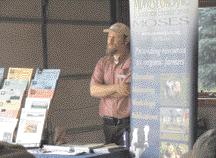



MOSES staff members participate on various national and regional coalitions to offer a farmer voice to political discussions and decisions on priorities for action. As members of both the National Sustainable Agriculture Coalition (NSAC) and the National Organic Coalition (NOC), MOSES is honored to do this work and our participation is highly valued and well respected.
Fearless Farm Finances


Fearless Farm Finances is a three-year project funded by the USDA Beginning Farmer and Rancher Development Program. The primary product of this project is a book on farm financial management titled Fearless Farm Finances, due out in February 2012. Also, a successful two-day financial workshop was held in December, and in 2012 an OU course and several conference workshops will continue to target the demand for financial training and resources.



MOSES is probably best known for organizing the nation’s largest organic farming conference, held annually at the end of February in La Crosse, Wisconsin. In its 22nd year the conference attracted more than 2,900 people, featured 70 workshops and attracted over 150 exhibitors, who were all served an abundance of organic food! Over $47,000 in scholarships were awarded to 337 participants.

Organic University
Since 2001, MOSES has planned day-long intensive courses to precede the OFC. In 2011, we offered nine courses to almost 600 participants covering diverse topics ranging from growing mushrooms to small grains.


Organic Research Forum

The last five years has seen large growth of organic research projects at both public land-grant universities and private institutions. The Organic Research Forum at the OFC has helped bring that research directly to organic producers. Farmers, students and researchers connect through Research Forum Workshops that allow university researchers to present the findings and implications of their recent work, the Research Poster Display, which allows researchers and graduate students an opportunity to display their work and discuss the findings with conference attendees, and Networking Meetings between university researchers and the organic industry.





Since 2003, the annual MOSES Organic Farmer of the Year Award has been presented to an outstanding organic farmer or farm family to recognize those who practice outstanding land stewardship, innovation, and outreach. In February 2011, MOSES introduced the Vetter Family of The Grain Place outside of Marquette, Nebraska as the 2011 MOSES Organic Farmer of the year. Father and son, Don and Dave Vetter, with Dave’s brother-in-law, Mike Herman, have produced a wide range of organic crops not typically seen in the region, such as edible soybeans, edible dry beans, blue and white corn, popcorn, heirloom barley, flax, amaranth, lupines, sunflowers, and pasture. The 280-acre farm, which has been organic since 1975, features small fields and diverse rotations. The pastures are rotated on a nine year rotation and support a cow/calf herd of direct marketed grass finished beef. Fruit and nut trees are planted in buffer zones to increase biodiversity and add additional income. The Vetter farm has hosted numerous farm tours for local, regional, national, and international groups and serves as a model of sustainability. Dave Vetter recommends that famers never stop observing, experimenting, and building upon the good work of enhancing their ecosystem, both below and above ground. Nominations for the MOSES Organic Farmer of the Year Award are accepted March through September 15th. Learn more on our website.





MOSES was proud to have the generous support of the following foundations, businesses and government agencies in 2011, working with us to benefit organic and sustainable agriculture into the future.
AgStar Fund for Rural America Albers-Kuhn Family Foundation Brico Fund Carolyn Foundation Ceres Foundation Farm Aid Frontier Natural Products Co-op Harry Chapin Foundation Horizon Organic McKnight Foundation Newman’s Own Foundation Stonyfield Farms UNFI USDA – Beginning Farmer and Rancher Program USDA – Risk Management Agency Whole Foods Market Wisconsin Farmers Union
In addition, the strong grassroots support from hundreds of individuals, families and local businesses provide a solid footing for MOSES programs. We thank you for helping organic farmers to succeed!




Financials Fiscal Year 2010 - 2011

September 1, 2010 – August 31, 2011 Audited statement
Expenses: Programs Conference/OU Grow Organic Program Special Projects Broadcaster Newspaper Cost of Sales Fundraising Expense Management and General Total Expenses
$482,049 $256,375 $93,586 $44,155 $57,958 $64,072 $284,332 $1,282,527 Income: Programs Conference/OU Grow Organic Program Special Projects Broadcaster Newspaper Sales Operating Support Miscellaneous Total Income
$562,519 $233,521 $170,150 $42,585 $53,736 $271,798 $26,632 $1,360,941





Assets Operating Funds $158,087 Restricted Funds – Board Designated $215,942 Temporarily Restricted $331,175 Total Net Assets $705,204
Although this annual report represents 2011, the financials reported represent the MOSES fiscal year. Financials reported are audited by Wegner LLP, and are based on generally accepted accounting principles for nonprofits. Temporarily Restricted Assets result from contributions and other inflows of assets whose use is limited by stipulations that either expire by time or are fulfilled obligations.





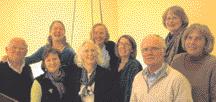

MOSES Staff:
Faye Jones, Executive Director Harriet Behar, Organic Outreach Specialist Jill Goodrich, Office Administrator Nancy Frank, Development Director Eric Hatling, Media and Public Relations Coordinator Jody Padgham, Financial Manager Joe Pedretti, Organic Education Specialist Angie Sullivan, Organic Resource Specialist Sarah Broadfoot, Administrative Support Jessie Padellford, Administrative Assistant
PO Box 339 Spring Valley, WI 54767 715-778-5775 mosesorganic.org
2011 MOSES Board of Directors:
Linda Halley, President, Gardens of Eagan, MN Atina Diffley, Vice President, Organic Farming Works, MN Roger Blobaum, Treasurer, Blobaum & Associates, DC Darlene Coehoorn, Secretary, Viewpoint Acres, WI Carmen Fernholz, A-Frame Farm, MN Melinda Hemmelgarn, Food Sleuth, MO Margaret Smith, Ash Grove Farm, IA Carla Wright, Savanna Hill Farm, WI



A MOSES Welcome
2010 proved to be another year of significant growth for the Midwest Organic and Sustainable Education Service (MOSES). Now settled into a downtown office building in Spring Valley, Wisconsin, we have seen our activities and impact increase as we leverage the benefits the office provides. Comfortable staff offices, a sunny meeting room, a public library, a staff kitchen, a dedicated room for the computer server, plus room for books and other materials, all support an increased efficiency and capacity of the organization.
A garage was added during the summer to house the MOSES vehicle on-site, while also providing additional storage and increasing the security and safety of staff with a new back entrance. Utilizing several local contractors, the project was the talk of our small town.
The creation of a new Director of Development and Systems position, and the hiring of Kelli Cameron to fill that role, was the result of an important assessment and reorganization of the organization’s staffing needs. Now with nine full-time employees, the staff has doubled in five years reflecting the growth and demand for organic food production. We also recognized the need to spend additional time and resources on human resources and staff training as responsibilities become more focused and specialized.
The many changes and increased support in Washington, D.C. for organic agriculture have resulted in a growing opportunity of our organization to support national organic agriculture issues. The amount of time dedicated to national activities continues to increase.
Although the MOSES programs are in demand across the country, we continue to provide numerous important services and activities for the Midwest organic community, and feature many of these successful and well-established programs in this annual report. MOSES looks forward to a productive and eventful 2011 focusing on the continued growth in numbers of farmers and acreage devoted to organic and sustainable practices. The health of our people and our planet depend on it! Thank you to all of the MOSES supporters, individuals, businesses, foundations and government organizations, for an ongoing commitment to MOSES programs and the important audience of organic and sustainable farmers supported through our educational initiatives.
A MOSES History
MOSES developed in 1996 from the activities of the Wisconsin Organic Crop Improvement Agency, as the need for educational resources about organic production and certification was recognized. MOSES was incorporated as a 501(c)3 nonprofit organization in 1999, when the primary focus was the organization of the Upper Midwest Organic Farming Conference. The organization has since grown into a convener of farmers, researchers, students and industry professionals for a wide diversity of year-round organic and sustainable educational programs. MOSES serves farmers striving to produce high-quality, healthful food using organic and sustainable techniques. These farmers produce more than just food, they support thriving ecosystems and vibrant rural communities.
Our mission is to help agriculture make the transition to a sustainable organic system of farming that is ecologically sound, economically viable, and socially just, though information, education, research, and integrating the broader community into this effort.
The goal of the Midwest Organic and Sustainable Education Service is to increase the number of farmers successfully using organic and sustainable farming practices, while also increasing the amount of acreage in organic production.

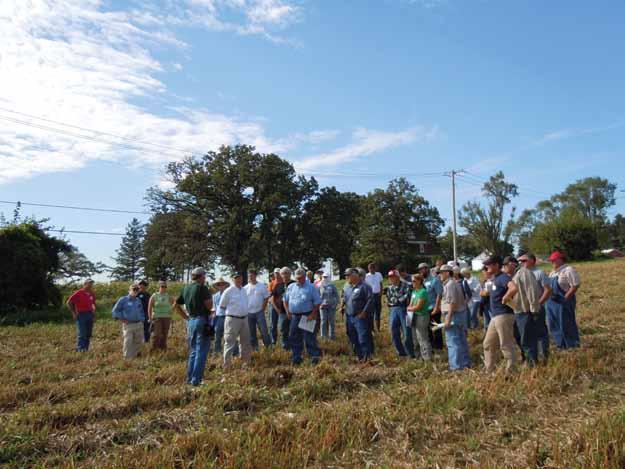

Grow Organic Initiative
In 2005, the Help Wanted: Organic Farmers educational campaign was launched to draw attention to the expanding need for organic production and increase the number of organic farmers to satisfy the rapidly growing consumer demand. Now, six years later, the campaign has grown and evolved to reflect the needs of farmers and the industry. To better reflect its goals, it changed names in 2010 and is now known as the Grow Organic Initiative.
The goal of the Grow Organic Initiative is to assist an increasing number of farmers in the adoption and integration of organic and sustainable production practices. The outreach efforts identified in assist producers in making sound decisions and addressing common challenges.
Key highlights of the past five years include:
• Dedicated staff: two organic specialists focusing on outreach, education and policy improvement and an event and resource coordinator to manage the planning and implementation of trainings and resources. • Enhanced resources: workshops, trainings and farm field days, many in collaboration with regional partners.
Development and distribution of thirty fact sheets on various organic production topics for farmers. Annual updates and an online, searchable version of the
Upper Midwest Organic Resource Directory. Ongoing improvement of the website, providing online access to numerous educational resources. • Hands-on programming: implementation and continuation of a successful Farmer-to-Farmer
Mentoring program matching experienced organic farmers with new organic farmers. • Customized support: answering over 1,200 toll-free calls about organic certification and production through the
Organic Infoline. • Diversified marketing: utilization of the public news networks, social media including Facebook and
Twitter, and presence at regional traditional ag shows and conferences for increased promotion of organic agriculture, programs and resources. • National influence: working with numerous partners to suggest change to the federal farm and food policies. • Influencing institutional education: developing teaching modules with college programs on sustainable farming techniques. The past five years paved the road for the success of the Grow Organic Initiative. With ongoing support and continuous improvements, MOSES will continue to create and implement programs to help farmers transition to sustainable and organic farming systems that are ecologically sound, economically viable, and socially just through information, education, and research.
The Organic Broadcaster offers farmer-focused, current news and information that assists farmers in successful organic production and offers relevant updates about the organic community.
Late in 2009, the MOSES Board of Directors decided to expand the impact of our bi-monthly publication, the Organic Broadcaster by offering it as a free publication to friends and supporters. The value of the publication was recognized as being unique in the organic industry, with farmer-focused, productionoriented articles, up-to-date industry news, a large number of organic-dedicated business and classified advertisements, and updates on Federal policies and programs. In November, the first free issue was sent to over 8,000 households, and also offered online in both HTML and PDF formats. A new design was unveiled, offering a more open and readable format. Now this valuable publication will be widely available at no charge to thousands of farmers and others who benefit from its content.




National Policy Work Continues to be a Focus
MOSES Executive Director Faye Jones and Organic Specialist Harriet Behar interact with numerous partners throughout the year to affect change in Washington, D.C. MOSES provides a unique contribution in representing the farmer voice on several national coalitions. The staff’s strong farm experience and depth of knowledge of organic systems is well respected and relied on by organic industry partners for the policy work. The National Organic Action Plan, developed by the National Organic Coalition, was presented to national, state and local policymakers with recommendations on specific programs to support the advancement of organic agriculture in the United States. Many of these suggestions have already been implemented and others will be advocated for inclusion in the 2012 Food and Farm Bill. A large grant project in partnership with the National Sustainable Agriculture Coalition and funded by the National Resource Conservation Service (NRCS) will help integrate organic into the NRCSConservation Stewardship (CSP) and Environmental Quality Incentives (EQIP) programs. Harriet is the lead on the NRCS project training team, charged with developing programs to train government employees and contractors about organic practices. The participation of MOSES on numerous state and regional advisory committees has resulted in greater awareness and acceptance of organic agriculture in the Midwest and throughout the country.
2010 Farmer of the Year
In February, John, Jane and Janake Fischer-Merritt were honored as the 2010 MOSES Organic Farmer of the Year. The family owns and operates Food Farm, an organic vegetable farm near Wrenshall, Minnesota. “We are a community-supported farm that is more diversified than most CSA (community supported agriculture) farms, with a big root cellar so we can deliver winter and summer shares,” said John Fisher- Merritt. They have delivered produce through their CSA since 1994.
The Fisher-Merritts approach their farm as a living organism, and manage their soil so it can be farmed forever. Diversity of production includes grazing poultry as part of the system to improve soil, lessen weeds and manage insect populations. In 2000, the Fisher-Merritts designed and built an innovative energy efficient earth-heated root cellar/cooler which has enough storage to supply their CSA members and the retail stores in Duluth, Minnesota with root crops throughout the winter. They farm in a way that allows each of them to explore interests beyond farming, enhancing their community through their contributions to art and culture, including a local film festival that takes place in a barn.

Since 2003, the annual MOSES Organic Farmer of the Year Award has been presented to an outstanding organic farmer or farm family to recognize those who practice outstanding land stewardship, innovation, and outreach. 7


MOSES Projects:
Organic Farming Conference
The 21st annual Organic Farming Conference (OFC) held on February 25-27, brought 2,701 people to La Crosse to learn, network and celebrate. A participant’s comments sum up the event’s impact well: “The conference provided exactly what I hoped - energy, excitement, enthusiasm for farming and a flood of ideas on getting started!”
Organic University
In its 10th year, the Organic University hosted 431 people for ten day-long courses prior to the beginning of the Organic Farming Conference. This dedicated time to one focus area allowed for intensive learning and dialogue with each other and the course facilitators.
Organic Research Forum
Dedicated funding supports a workshop track and additional activities at the OFC designed to bring the results of organic research to farmers, and allow farmers to influence and comment on organic research. The annual forum is also a venue for organic researchers to learn from and collaborate with each other and with graduate students.
Farmer-to-Farmer Mentor Program
Through leadership and organizational planning, MOSES worked with 24 mentees and 19 mentors in the second year of this highly-valued program. A participant shares: “Thanks to the awesome mentor program which got me off on the right foot in organic and sustainable farming. This program gave me courage to keep going... before this I was confused, scared and nearly gave up.” The program matches new or transitioning organic farmers with experienced organic farmers in their geographic area who also operate similar farming systems.
Rural Women’s Project
Over 1,000 women are involved through the project’s “Planting Fresh Seeds” workshops, which highlighted case studies of successful women farmers and entrepreneurs along with a synthesis or resources and grants that prioritize women. Numerous other initiatives within the project support, educate and highlight women’s agricultural success. In addition, the project’s director participates in national programs including The White House Project, in support of organic and sustainably-focused rural women.
MOSES Events and Outreach
MOSES staff lead, organize or attend 50 field days, trainings, conferences and other events throughout the year, offering a wide diversity of resources and support to thousands of farmers.
Farm Financial Management
A three-year project funded by the USDA Beginning Farmer and Rancher Development Project is underway with the primary outcomes identified as a book simplifying recordkeeping and financial management for farmers and a two-day training on the basics of farm financial management.
Midwest Season Extension Website
In a partnership with the Minnesota Institute for Sustainable Agriculture and the Institute for Agriculture and Trade Policy, MOSES develops a website with hundreds of resources, events, program listings and project reports at http://www.midwestseasonextension.org/
Monthly Electronic Newsletter
MOSES disseminates a monthly electronic newsletter with reports on activities, government programs, and industry updates. Each issue is emailed to over 7,000 addresses.
Guidebook to Organic Certification
First published in 2005, this valuable resource was updated in 2010 with new pasture regulations and other changes to the organic standards. The easily readable question and answer format is a benefit to many farmers to interpret the policies and processes.

Learn more at: www.mosesorganic.org 9

The following foundations and government agencies generously supported MOSES in 2010:
Albers Kuhn Family Foundation Blooming Prairie Foundation Brico Fund Ceres Foundation CROPP/Organic Valley: Farmers Advocating for Organics Farm Aid Frontier Natural Products Co-op Horizon Organic McKnight Foundation Newman’s Own Foundation Outpost Natural Foods Stoneyfield Farms UNFI USDA – Beginning Farmers and Ranchers Development Program USDA – Risk Management Agency Whole Foods Market, Inc.
MOSES thanks the hundreds of individuals, families, and businesses that continue to support organic and sustainable farmers through their donations to MOSES programs and initiatives. Your support is helping organic farmers succeed!
Financials for Fiscal Year 2009-2010 September 1, 2009 – August 31, 2010
Expenses:
Conference Organic University Grow Organic Initiative Special Projects Broadcaster Newspaper Cost of Sales Fundraising Office Overhead Office Building
Total Expenses
392,097 39,792 263,046 123,651 22,820 39,655 118,385 100,183 31,607
$1,131,236
447,391 53,250 92,961 145,508 38,489 53,072 210,033 30,351
$1,071,055


Income:
Conference Organic University Grow Organic Initiative Special Projects Broadcaster Newspaper Sales Operating Support Miscellaneous
Total Income
Assets:
Operating Funds Restricted Funds–Board Designated Temporarily Restricted
Total Net Assets
209,787 266,327 157,949
$634,063
Although this annual report represents 2010, the financials reported represent the MOSES fiscal year. Financials reported are audited by Wegner LLP, and are based on generally accepted accounting principles for nonprofits. Temporarily Restricted Assets result from contributions and other inflows of assets whose use is limited by stipulations that either expire by time or are fulfilled obligations. Special Project Programs include payments for joint project work to other collaborating nonprofit organizations.
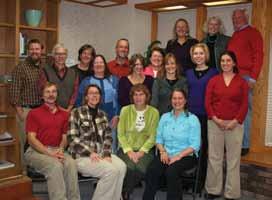
Back Row (left to right) Joe Pedretti, Eric Hatling, Cathy Olyphant, Chris Blanchard, Atina Diffley, Carla Wright and Roger Blobaum Middle Row (left to right) Harriet Behar, Sarah Broadfoot, Jody Padgham, Angie Sullivan, Kelli Cameron and Erin Altemus Front Row (left to right) Tom Miller, Linda Halley, Darlene Coehoorn and Faye Jones Not pictured Melinda Hemmelgarn and Margaret Smith

P.O. Box 339, Spring Valley, WI 54767 p. (715) 778-5775 • f. (715) 778-5773 www.mosesorganic.org
MOSES Staff:
Faye Jones, Executive Director Harriet Behar, Organic Specialist Sarah Broadfoot, Organic Farming Conference Assistant Kelli Cameron, Director of Development and Systems Eric Hatling, Media and Public Relations Coordinator Cathy Olyphant, Office Administrator Jody Padgham, Associate Director Joe Pedretti, Organic Specialist Sarah Stone, Marketing Coordinator and Webmaster Angie Sullivan, Resource and Events Coordinator
2010 MOSES Board of Directors:
Linda Halley, President, Gardens of Eagan, Minnesota Atina Diffley, VP, Organic Farming Works, Minnesota Roger Blobaum, Treasurer, Blobaum & Assoc., Washington, D.C. Darlene Coehoorn, Secretary, Viewpoint Acres, Wisconsin Chris Blanchard, Rock Spring Farm, Iowa Melinda Hemmelgarn, Food Sleuth, Missouri Tom Miller, R & G Miller & Sons, Inc., Wisconsin Margaret Smith, Ash Grove Farm, Iowa Carla Wright, Savanna Hill Farm, Wisconsin
2009 Annual Report

www.mosesorganic.org
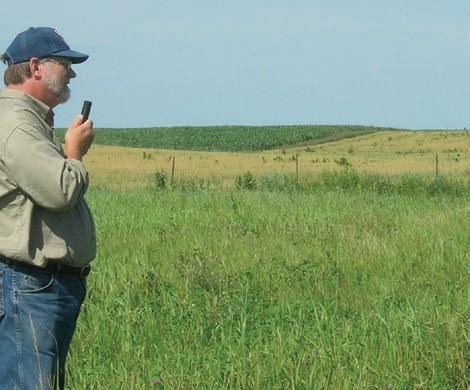
Our mission is to help agriculture make the transition to a sustainable organic system of farming that is ecologically sound, economically viable, and socially just, through information, education, research, and integrating the broader community into this effort.
a MOSES WELCOME
2009 has been a year of exciting
growth and activity at MOSES. The purchase of our new office building in downtown Spring Valley, Wisconsin has been an overwhelmingly positive change for the organization, the staff and the community. We are well settled in and systems are flowing smoothly! The new office has us well positioned to keep pace in serving the needs of our growing industry in 2010 and beyond. With the addition of a new staff position, outreach coordinator Jeff Gunderson, we have increased our capacity to respond to the educational and outreach needs of farmers and others around organic and sustainable production. We
detail in this report the continuation of numerous successful initiatives.
It has been heartwarming for us to see continued funding from many familiar, but also new sources in these challenging economic times. It is obvious to us that the community around us values organic and sustainable farmers, and the work MOSES does to encourage and support them. It has also been a rewarding year of support from Washington, in the tone of funding for several federal programs that may be used to support organic farmers. It has been a stimulating year of organic in the news and in people’s minds. We look forward to 2010 and the continued development of programs and resources that ensure we all have access to good clean food, and that the farmers who produce it are sustained and sustainable.
a MOSES HISTORY
MOSES grew out of the activities of the WI OCIA certification agency educational fund in 1996, whose members and board recognized that there was a growing demand for educational resources about organic agriculture. The organization was legally incorporated as a 501c3 nonprofit in 1999, with organic farming education as its mission. Early MOSES activities focused on managing the ever-growing Upper Midwest Organic Farming Conference, first held and organized by WI OCIA in 1989.
Today MOSES offers year-round education about organic farming and certification through a variety of resources, trainings, events and field days.
The staff, originally just Executive Director Faye Jones, has now grown to eight full time positions. In April of 2009 MOSES purchased an office building and moved the organization to downtown Spring Valley, Wisconsin.
The Midwest Organic and Sustainable Education Service
(MOSES) is a non-profit 501c3 education-outreach organization working to promote sustainable and organic agriculture in the Midwest.

MOSES serves farmers striving to produce high-quality, healthful food using organic and sustainable techniques. These farmers produce more than just food; they support thriving ecosystems and vibrant rural communities. MOSES offers a variety of programs to assist farmers, agricultural educators, organizations and others requesting information. We organize events and provide resources and referrals to help people learn more about the growing opportunities in organic agriculture. MOSES’ goal is to have more farmers successfully using organic and sustainable farming practices. page 3
new MOSES OFFICE
The purchase of an office building in Spring Valley has been a giant leap forward in the organization’s development. In 2008, the MOSES board began discussing the need for an office move as the organization was outgrowing its trailer house office. After much searching and background work, by March of 2009 MOSES was the proud owner of a spacious, reasonably priced office building. A formal open house was held on May 19th, inviting neighbors and MOSES fans to stop by for a look. We now have the space to grow, but not a large financial burden to shoulder.
The new office has brought many physical improvements to the organization:
•Private offices for in-house staff. • A beautiful, sunny conference room. • A room dedicated to our expanding books and print resources. • A front “lobby” holding the MOSES expanded lending library. • A kitchen/break room with cooking facilities. • A public presence on the town’s main street, encouraging interaction with the local community as well as with MOSES constituents in general. Overall, the office move has had positive impact way beyond expectations. ED Faye Jones claims

Improved Internal Administrative Systems
Improvements in several internal systems, including the development of an enhanced personnel benefits package, the hiring of an on-call human resources consultant and contracting with an external payroll service have been direct consequences of our expanded capacity.
expanded MOSES staff NEW OUTREACH COORDINATOR
In May of 2009 MOSES brought on a second outreach staff person, Jeff Gunderson.
The addition of Jeff’s position doubles MOSES’ capacity to provide direct outreach to farmers and others about organic production and certification
and sustainable farming practices. Jeff came to MOSES from an organic research position at North Dakota State University in Dickinson, ND. MOSES is thrilled to add Jeff’s expertise in organic crop production and research to our already strong outreach program. In his first eight months, Jeff became the first organic “technical service provider” (TSP) to the NRCS, began working on curriculum content for our Sustainable Ag. in Western Wisconsin Partnership and has attended numerous events and trainings where his expertise has been highly valuable. He is also the coordinator of the new Organic Research Forum.

renewed focus on RESEARCH
MOSES is proud to have secured three years of funding in mid-2009 that will support an ongoing initiative to connect organic researchers to the farmers they serve. The key-
stone of this project is an Organic Research Forum, to be held annually in conjunction with the MO-
SES Organic Farming Conference. The Forum will bring together researchers interested in organic, graduate students, and farmers to hold discussions and learn about current research and research needs. An expanded goal of this project is to create an ongoing dialog and atmosphere of belonging for researchers interested in organic issues, to further collaborations and peer-support for their work. Connected to the Extension-generated eOrganic web resource, this initiative will be ongoing, with national effect.
MOSES
PROJECTS
•20th Anniversary MOSES Organic Farming Conference (OFC).
A special celebration for the 20th annual Organic Farming Conference on Feb 26-28, 2009 brought 2600+ individuals from 37 states to La Crosse, Wis. for inspiring education, great food and inspiring conversation. • Organic University. Ten day-long intensive courses were offered to 468 farmers the day before the OFC. • Organic Research Forum. Development work began on offering organic research presentations, poster sessions and peer discussions for researchers and students at each annual Organic Farming Conference beginning in 2010.
•Farmer-to-Farmer Mentoring Program.
24 new farmers worked with 20 experienced organic producers to learn the “tricks of the trade.”
•MOSES 2009 Organic Farmer of the Year Award.
Tom and Irene Frantzen, of Frantzen Farm, New Hampton, IA, receive the 2009 “MOSES Farmer of the Year” award. • Help Wanted: Organic Farmers. MOSES’ outreach to farmers about successful, sustainable organic production continued to be a primary focus through the Help Wanted program. Staff hosted tables at several large ag. shows in several states. We attended the National FFA convention as well as many regional conferences and other events. New fact sheets were created, the toll free hotline brought in hundreds of calls and several organic field days were well attended. • Rural Women’s Project (RWP). Ten women farmers and rural business leaders networked and learned how to work with media and communicate their message. An exciting new feature of the 2009 RWP was the

development and implementation of a series of training and networking seminars titled, “See Jane Grow: How Women Ecopreneurs are Leading America’s Rural Renaissance.”
•Sustainable Ag. in Western Wis. Partnership.
In 2009 this joint project of the UW River Falls, Chippewa Valley Technical College, and MOSES hosted a one day workshop on high tunnel production, attended by 250, and a Local Foods Conference, attended by 225. This unique partnership offers support for degree programs and curriculum development, as well as community outreach, in sustainable farming systems. • MOSES Web Resources. News and information about organic and sustainable farming is at your fingertips on the MOSES website. The popular Upper Midwest Organic Resource Directory was reprinted in the 9th edition, and is now a fully searchable, on-line data base accessible from the website. A monthly e-newsletter updates hundreds of subscribers on issues of interest to the organic community. MOSES is now on Twitter and Facebook! • Organic Broadcaster Newsletter. Each issue of our 20-page bi-monthly newspaper, offering farmer-based organic news, reaches over 2,400 individuals, families and businesses.

•Networking. Executive Director Faye Jones and Organic Specialist Harriet Behar participated in numerous regional and national meetings and events with peer organizations to discuss utilization and implementation of federal programs useful to organic farmers.
Learn more at www.mosesorganic.org!
Web resources, fact sheets, book sales and participation in over 30 conferences, trade shows, field days and workshops brings MOSES resources and staff knowledge to interested conventional, transitioning and organic farmers throughout the Midwest. Our extroverted educational team is happy to engage beginners or experienced producers in conversation and information sharing, either in person, over the phone or via email. Our toll-free “Organic Info Hotline” contin-
FARMER outreach ues to draw hundreds of calls per year. Fact sheets and other resources are updated regularly, with new topics added frequently. Our participation in the National Future Farmers of America (FFA) conference and numerous large ag. trade shows allows those curious about organic to take that first important step in accessing resources for sometimes confusing questions. MOSES is a valuable “go-to” resource for anyone with questions about organic production and certification or sustainable farming.
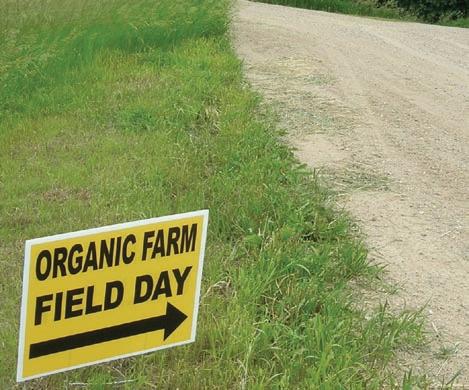
Collaborating with Partner Farming Organizations
MOSES organized and hosted 16 organic train-
ings and farm field days in 2009 in partnership with many of our valued partner organizations in the sustainable farming community. These collaborative efforts are important because they enable us to combine our resources, promote a stronger message and reach more farmers. Some of our collaborators in 2009 included the Practical Farmers of Iowa (PFI); Land Stewardship Project (LSP); the Wisconsin Department of Ag., Trade and Consumer Protection (DATCP); Iowa State University Extension Service; and the University of Minnesota Extension Service.
Hundreds of hours of hard work by key MOSES staffers Faye Jones and Harriet Behar, as well as that of numerous national partners, led to strong gains for organic farm support in the 2008 farm bill, and federal programming overall. A key piece of MOSES’ 2009 work has been educating about and connecting farmers to these expanded federal programs. We are proud to report that Wisconsin and Minnesota were top states in numbers of farmers to sign up for 2009 Environmental Quality Incentives Program (EQIP) and the Organic Initiative and Conservation Stewardship Program (CSP), both of which have funding available to reward and support organic conservation measures. MOSES will be doing ongoing work to ensure that organic and sustainable farmers know of and use these and other federal programs. To this end, we have created a webpage and accompanying fact sheet, titled “Funds for Farmers” (www.mosesorganic.org/fundsforfarmers. html), which contain regularly updated information on government and other programs of benefit to organic and sustainable farmers. Having fought hard for more parity in support of organic research and production in federal programs, MOSES feels it is imperative that we help farmers learn about and utilize these programs. We will continue to make this work a priority.
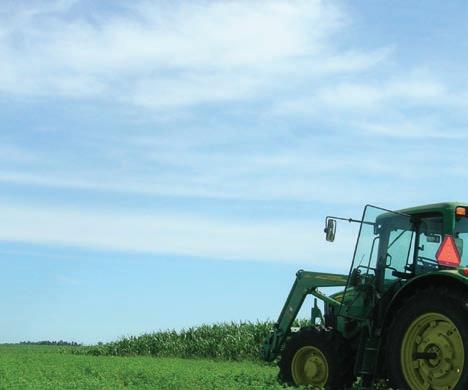

Sept. 1, 2008 - Aug. 31, 2009 Financials FY 08-09
EXPENSES
Conference 441,294 OU 45,301 Broadcaster Newspaper 37,086 Fundraising Expense 62,754 Cost of Sales 47,176 Help Wanted Programming 209,267 Grants/Projects 82,198 Office Overhead 47,537 Building Expense 104,868 Capital Expenses ___________________________ 2,334
Total Expenses 1,079,815 INCOME
Conference 459,487 OU 63,555 Broadcaster Newspaper 43,374 Fundraising 87,392 Sales 65,079 Help Wanted Support 216,544 Grants/Projects/ Agreements 123,468 Misc. ___________________________ 15,395
Total Revenue 1,074,284
LIABILITIES
Bldg. Loan 73,567
6% sales 8% indiv. donors 2% misc.
9% gov’t grants
20% foundations
54% programs MOSES Income Sources
54% PROGRAMSprograms 54% 20% FOUNDATIONSfoundations 20% 9% GOVERNMENT GRANTSgovernment grants 9% individual donors 8% 8% INDIVIDUAL DONORSsales 6% 6% SALESmisc 2%
2% MISC.
The following foundations and government agencies generously supported MOSES in 2009.
Albers-Kuhn Family Foundation
Blooming Prairie Foundation
Brico Fund
Ceres Foundation, Inc.
CROPP/Organic Valley Farmers Advocating For Organics
Frontier Natural Products Co-op
Horizon Organic
McKnight Foundation
Newman’s Own Foundation
Stonyfield Farms
USDA – RMA
Whole Foods Market 5% Day Though there are too many to list here, MOSES would like to thank the hundreds of individuals, families and organic-focused businesses that helped support organic and sustainable farmers through their support of MOSES programs and initiatives in 2009.

STAFF
Faye Jones Executive Director Harriet Behar Organic Specialist Jeff Gunderson Outreach Coordinator Eric Hatling, Development & Communications Coordinator Cathy Olyphant Office Manager Jody Padgham, Finance Manager & Organic Broadcaster Editor Sarah Stone, Marketing Coordinator & Webmaster Angie Sullivan, Resource & Administrative Coordinator
Audrey Arner, President Moonstone Farm, MN Linda Halley, Vice President Gardens of Eagan, MN Roger Blobaum, Treasurer Blobaum & Associates, Wash. DC Atina Diffley, Secretary Organic Farming Works, MN Chris Blanchard Rock Spring Farm, IA Darlene Coehorn Viewpoint Organic Acres, WI Paul Dietmann WI Farm Center, DATCP, WI

2009 BOARD of Directors Melinda Hemmelgarn Food Sleuth, MO Tom Miller R & G Miller & Sons, Inc. WI Margaret Smith Ash Grove Farm, IA
PO Box 339, Spring Valley, Wis. 54767 p. (715) 778-5775 f. (715) 778-5773 www.mosesorganic.org
MOSES

Annual Report 2008
As we look back on a successful year here at the Midwest Organic and Sustainable Education Service (MOSES), we also look forward to an exciting future. The coming year holds so much promise, for our organization and for all those who are working for a more sustainable food system. The 2008 Farm Bill contains provisions that will bring more farmers, beginning as well experienced, into organic and sustainable agriculture. MOSES is well-poised to meet the increased need for farmer education, resource development, and networking in the region.
In April of 2009 we are moving into a new office in downtown Spring Valley, WI. The new office will not only allow us to expand existing programs and create new ones, but it will also provide a space for meeting in-person with farmers, students, community groups, and the general public. We welcome these new opportunities and look toward 2009 with optimism and enthusiasm.
INSIDE 2about moses 3our programs 7financials

WHO WE ARE
The Midwest Organic and Sustainable Education
Service (MOSES) is a non-profit 501c3 education outreach organization working to promote sustainable and organic agriculture.
MOSES serves farmers striving to produce high-quality, healthful food using organic and sustainable techniques. These farmers produce more than just food—they support thriving ecosystems and vibrant rural communities.
MOSES offers a variety of programs to assist farmers, agricultural educators, organizations, and others requesting information. We organize events and provide resources and referrals to help people learn more about the growing opportunities in organic agriculture.
MOSES History
The Midwest Organic and Sustainable Education Service (MOSES) is a thriving educational non-profit organization serving farmers and others throughout the Midwest from an office located in rural Spring Valley, Wisconsin. MOSES grew out of the activities of the WI OCIA certification agency Educational Fund, whose members and board recognized that there was a growing demand for educational resources about organic agriculture. Thus the idea of MOSES —an entity devoted to the educational needs surrounding organic and sustainable production—was born.
Legally incorporated as a 501c3 nonprofit in 1999, early MOSES activities focused on managing the ever-growing Upper Midwest Organic Farming Conference (first held and organized by WI OCIA in 1989). The original MOSES “office” was a closet in Faye’s home and eventually moved to a trailer home on her property. Today the organization continues to coordinate not only the largest organic conference in the country but also a growing number of new projects. MOSES offers education year-round about organic farming and certification through a variety of resources, trainings, and field days. The staff, originally just Faye Jones, has now grown to seven full-time positions.
GROWING ORGANIC FARMERS
MOSES has grown at a remarkable
pace during the past 10 years. Upon reflection, at the end of a very successful year of activities in 2008, we see for the first time an annual budget above a million dollars, expansion to seven fulltime and several temporary part-time conference staff, and the ongoing development of a broad collection of projects and partnerships. MOSES continues to be well renowned as an efficient and productive organization, offering leadership, integrity, unique knowledge and resources to those both new and established in the organic community.
HELP WANTED
Organic Farmers wanted
to grow high quality organic crops. FREE transition resources available through the Midwest Organic and Sustainable Education Service (MOSES). Get started today with our FREE Organic Starter Packet. Visit us on the web at www.mosesorganic.org or by calling 715-772-3153 for more information and resources.
Help Wanted:
Organic Farmers a Continued Focus
We are especially proud of the activities offered through our “Help Wanted: Organic Farmers” program. Rolled out in 2006 as a targeted educational campaign to reach new and transitioning organic farmers, this program has expanded to include numerous successful initiatives. Our toll-free “organic hotline” was initiated in 2007 in recognition of the awareness that farmers “just need someone real to talk to” about organic production and certification questions. Organic Specialist Harriet Behar now fields over 1,000 calls a year, with questions on everything from how to fill out an initial farm plan to where to find organic seeds to how to find an organic farm to purchase. Harriet also regularly calls those who attended a MOSES field day or event to find out how things are going and if they need any more help. Harriet notes that “these calls are usually more of a discussion than just a question and answer session, where they have a chance to think out loud and bounce ideas off someone who has experience and knowledge in an area that they wish to know more about.” Harriet continues, “I am very gratified to know that I have been helpful to these folks. When they say ‘Thank you so much’, I can say ‘You are very welcome—I am just doing my job,’ and encourage them to stay in touch.” MOSES has learned that this kind of direct, customized support is what people really need to become successful organic farmers. Also within the Help Wanted program are many activities that bring MOSES out into the community. In 2008 MOSES made it a priority to bring a resource-filled educational booth to several traditional ag trade shows in Wisconsin, Minnesota and Iowa. Long, hot, and often dust-filled days were wellrewarded with numerous engaged conversations, long lists of folks interested in receiving more information, and a car filled with emptied resource boxes to take home. We are convinced that the casual conversations initiated as a family walks by in search of free pens or the big tractor lot can be a valuable first action to get that farm on the path to organic practices.
FIELD DAYS, TRAININGS AND OTHER IMPORTANT BASICS
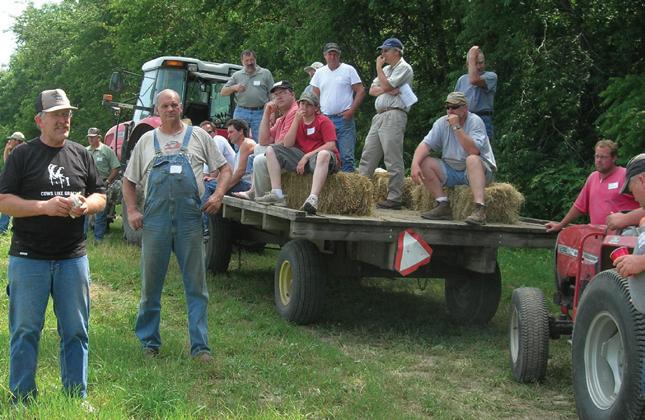
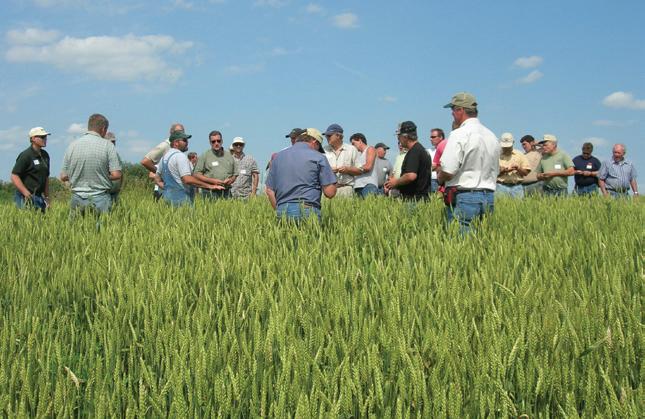
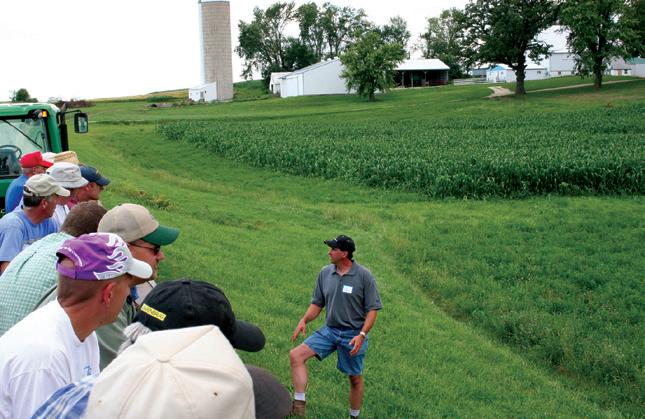
In a project called the “Organic Watershed Project,” designed to increase organic row crop and forage production in the upper Mississippi watershed, four organic field days were held to provide new and transitioning farmers a close look at successful organic grain and forage systems. Investing significant resources in publicity, including the help of a media consultant, radio spots, and direct mail postcard campaigns, these field days drew over 200 attendees, many of whom were new to our activities. Additional trainings in our “Organic Basics” program brought information about organic production and certification to an additional 175 producers in 2008. All of our trainings offer not only quality day-of educational programming, often on an organic farm or with an organic farmer panel or presenter, but also leave attendees with written resources to digest once they get home. These workshops and field days offer enough information for a farmer to get a taste of organic farming systems and decide if they want to learn more. Those with an on-farm component are also invaluable in offering tips and “organic best practices”.
MOSES continues to expand its valuable fact sheet collection, which, offered as online, downloadable two to four page summaries of important organic production and certification issues, are designed to be linked to, copied, and shared by others involved with educating farmers. Each new fact sheet we complete, such as “Planning the Organic Orchard” or “Considering Risk Before Starting an Organic Orchard,” both new in 2008, is announced to our diverse data base of contacts through electronic and print mechanisms in order to be picked up and linked through partner websites, which vastly expands our educational outreach and impact. “The Guidebook to Organic Certification”, initially published in 2005, was updated and reprinted in a new format in 2008. This valuable resource is popular with Extension agents as a handout for farmers interested in organic who come to their offices.
Direct Links to Organic Farmers
When asked what is most important in helping new organic farmers succeed, established farmers told us it was learning from others. “Find a mentor,” they said. We followed up by initiating the MOSES Organic Farmer Mentoring Program in 2008. Participating mentored farmer, Rick Dalen, comments about the relationship with his mentors John and Jane FisherMerritt: “Mentoring is really important to have available for small-scale organic farms. There aren’t schools that teach it and the learning curve is huge. If we didn’t have the Fisher-Merritts, I’m not sure we’d even be farming. The mentoring program is key to keeping sustainable agriculture viable.” The 2008 program paired 18 mentees with 11 mentors, and will be continued in 2009. In late 2007 MOSES identified a need to gain greater public recognition and visibility for new women leaders in the organic and sustainable farming community. This recognition led to the Rural Women’s Project, which has provided training and networking opportunities for ten women farmers and rural business leaders seeking to work with the media and communicate their message. Project participant, Tracey Mofle, comments on her experience: “Everyone involved with the Rural Women’s Project is motivated by a bigger umbrella picture of developing sustainable, healthy communities. It is refreshing how we are all systems thinkers, able to see how things interconnect. Thinking alike, we’re able to readily connect and support each other’s efforts.”
The “Upper Midwest Organic Resource Directory”, in its 8th Edition in 2008, a resource found by many farmers’ phones, contains contact information for everything from buyers to sources to certifiers and educational resources in the organic industry. Even though organic has grown out of the “infant” stage of development, information about where to get what within the industry is still not commonplace. With an annual print run of over 8,000 and free distribution to farmers, this is a valuable resource with a growing number of entries. New and very exciting in 2008 is the Directory as a searchable online database on the MOSES website. Now those looking for current contact information for a feed mill or veterinarian can find it at http://www. mosesorganic.org/resourcedirectory.html In 2008 the MOSES Board of Directors asked staff to make a push to increase the circulation of the Organic Broadcaster newspaper by 50%. Under the editorial hand of staff member, Jody Padgham, the publication continues to generate very positive reviews and commentary. We are pleased to report that we reached our circulation expansion goal, with this farmerfocused bi-monthly now reaching over 2,000 households. The wide diversity of MOSES resources became even more accessible in 2008 through the redesign of the MOSES webpage. New staff member, Sarah Stone, designed and coordinated the transition in early fall. Hits on the page topped 4,000 per day, a strong show of support and approval for the new easy-to-access organization of resources, events listing, and links. 4
One of MOSES’ strengths is its ability to foster strong partnerships. This has never been more apparent as in 2008, when several new partnerships were developed. We are enthusiastic about a unique three-way partnership involving MOSES, University of Wisconsin-River Falls, and Chippewa Valley Technical College. This educational initiative focuses on bringing sustainable farming principles and practices into institutional curriculums as well as outreach into the community. The first year of this three-year partnership hosted two very successful workshops, one on sustainable farming and the other on high tunnel production. MOSES plays an important role in providing resources and offering counsel for program design to the two institutional partners. Partnerships with national organic and sustainable farm policy organizations have been crucial during this year of politicking around the 2008 Farm Bill. MOSES was a well-regarded participant and leader in several important coalitions, including the National Organic Committee (NOC) and the Sustainable Agriculture Coalition (SAC). Significant gains were made for organic in the farm bill, and MOSES staff will continue to participate with diligence as programs are funded and oversight becomes important.
Education and Fun in La Crosse
Even with the broadening and diversification of our activities, the MOSES Organic Farming Conference and accompanying Organic University continue to be the cornerstones. In February 2008, almost 2,400 people again came to La Crosse to hear inspirational keynotes by nutritionist Melinda Hemmelgarn and activist Andrew Kimbrell, learn from over 90 presenters through over 60 workshops, talk with friends old and new and enjoy great organic food. Evaluations continue to tell us that this event is the highlight of many organic farmers’ year. “Inspirational,” “practical,” “great hands-on knowledge,” “learning from someone who has been there,” “great balance of farmer and researchers,” are frequent phrases found on evaluations. Our staff works hard year-round to present a smooth, friendly, and fun event. The participation of over 100 volunteers and 65 trade show exhibitors reinforce the value that this event has to the community. From the first conference and the beginning of MOSES, for nearly two decades, thousands of people have been brought together and significant projects have been spawned. Each year dozens of groups plan annual or organizational meetings to occur in conjunction with the conference. This event has centered, inspired. and supported the Midwestern and national organic movements, and MOSES is proud to be the host. MOSES is well positioned to move into 2009 with the continuation of all of the above programs and development of new initiatives. With a strong board of directors, a talented and experienced executive director, and seasoned staff, we look forward to continuing the achievement of our goal to have more farmers using organic and sustainable farming practices. We appreciate and acknowledge the support in time and contributions from all our partners and supporters.


2008 Farmer of the Year - Gary, Rosie, & Nicholas Zimmer, Otter Creek Organic Dairy.
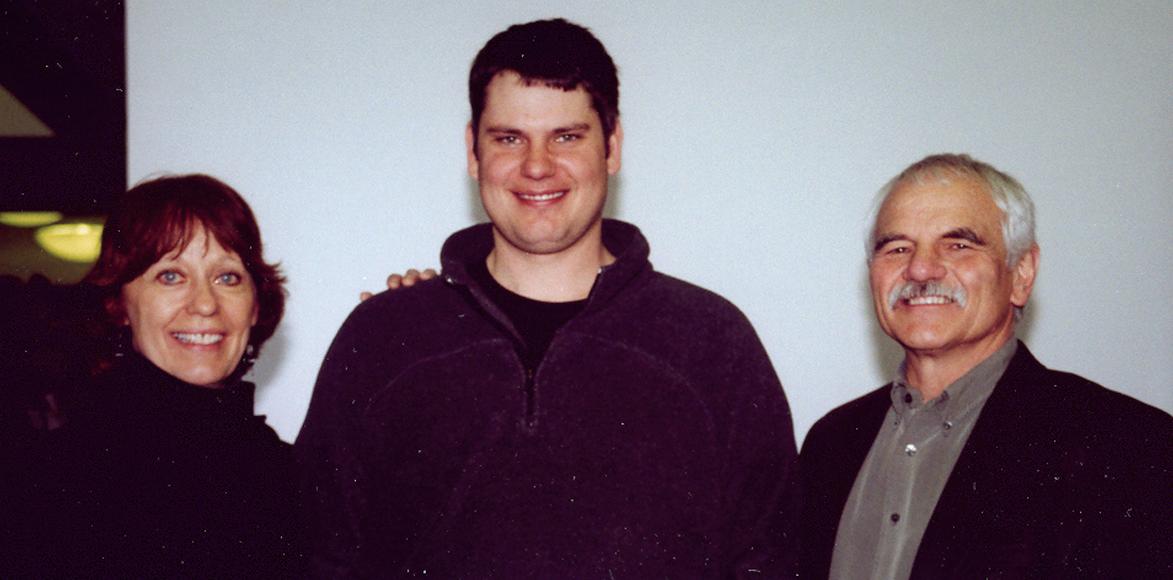
MOSES Staff - Cathy, Eric, Sarah, Harriet, Jody, Faye, & Jessica (left to right).

MOSES Organic Field Day - Field day participants enjoy a tour of Primus Farm.

• Organic Conference. The 19th annual Organic Farming Conference on Feb 21-23 brought almost 2400 individuals from 37 states to La Crosse, WI. • Organic University. Ten day-long intensive courses were offered to 422 farmers the day before the OFC. • Research Symposium. Through this unique grant funded offering, over 35 presentations on research relevant to organic production were given by university and independent researchers in conjunction with the MOSES OFC. • 2008 Farmer of the Year. Gary, Nicholas and Rosie Zimmer, of Otter Creek Organic Dairy, Avoca, WI, receive the 2008 “MOSES Organic Farmer of the Year” award. • Help Wanted: Organic Farmers. MOSES focused significant energy in 2008 toward helping new farmers transition to organic production through our toll-free “organic hotline,” “Help Wanted” packets, farm field days, “Organic Basics” trainings, expanded fact sheet list and staffed information booths at trade shows and numerous other events. • Organic Farmer Mentor Program. Eighteen new farmers worked with eleven experienced organic producers to learn the “tricks of the trade.” • Rural Women’s Project. Ten women farmers and rural business leaders networked and learned how to work with media and communicate their message. • Sustainable Ag in Western Wisconsin Partnership. Joining together UW River Falls, Chippewa Valley Technical College, and MOSES, this unique partnership offers support for degree programs and curriculum development, as well as community outreach, in sustainable farming systems. • MOSES Web Redesign. News and information about organic and sustainable farming became easier to find with the MOSES web redesign, rolled out in September. The popular Upper Midwest Organic Resource Directory was not only reprinted in the 8th edition, but is now a fully searchable, on-line database accessible from the new website. A monthly e-newsletter is initiated to update on issues of interest to the organic community. • Organic Broadcaster Newsletter. Outreach activities have broadened distribution of our 20-page bi-monthly newspaper, offering farmer-based organic news, to over 2000 households in 2008. • Networking. Executive Director Faye Jones and Organic Specialist Harriet Behar participated in numerous regional and national meetings and events with peer organizations to discuss how to maximize programming to farmers, as well as discuss strategies for generating 2008 Farm Bill support. • Tree Fruit Network. Quarterly newsletters, an active listserve, information packed webpage and other activities were generated for over 325 members of the Midwest Organic Tree Fruit Growers Network.
FINANCIAL REPORT 2007’08
INCOMEINCOMEINCOME Conference INCOME Conference Income Sources FY 07-08 ConferenceConference OUOU OU OB OU OB
419,045.03419,045.03 419,045.03419,045.0346,671.0046,671.00 46,671.0046,671.0036,656.8636,656.86 OBOB FundraisingFundraising 36,656.8636,656.86201,321.23201,321.23FundraisingFundraisingSalesSales 201,321.23201,321.2363,525.3363,525.33SalesSales Help Wanted SupportHelp Wanted Support 63,525.3363,525.33246,919.75246,919.75Help Wanted Support 246,919.75Help Wanted Support 246,919.75 Grants/Agreements/Projects* 136,843.21Grants/agreements/projects* 136,843.21Grants/Agreements/Projects* 136,843.21Grants/agreements/projects* 136,843.21 Misc 10,232.53misc 10,232.53Miscmisc TOTAL REVENUETOTAL REVENUE 10,232.5310,232.531,161,214.941,161,214.94 TOTAL REVENUETOTAL REVENUE 1,161,214.941,161,214.94

Sales 9%
Indiv & Business Donors 3.9%
Misc 0.9% Foundations 35%
Conference & Events 33.9% Gov’t Grants 17%
MOSES Board of Directors December 2008
The MOSES board consists of a majority of certified organic farmers and meets at least four times a year to provide governance to the organization. EXPENSESEXPENSESEXPENSES Conference EXPENSES Conference ConferenceConference OUOU OU OB OU OB OBOB Fundraising ExpenseFundraising ExpenseFundraising ExpenseFundraising Expense Cost of SalesCost of sales Cost of SalesCost of salesHelp Wanted ProgrammingHelp Wanted ProgrammingHelp Wanted ProgrammingHelp Wanted Programming Grants/Projects**Grants/projects**Grants/Projects**Grants/projects**Office Overheadoffice overhead Office Overheadoffice overheadCapital ExpensesCapital expensesCapital ExpensesCapital expensesTOTAL EXPENSESTOTAL EXPENSES
TOTAL EXPENSESTOTAL EXPENSES
311,666.19311,666.19 311,666.19311,666.1945,568.5445,568.54 45,568.5445,568.5428,139.6128,139.61 28,139.6128,139.6154,989.7754,989.77 54,989.7754,989.7754,288.8554,288.85 54,288.8554,288.85148,811.02148,811.02 148,811.02148,811.02181,121.59181,121.59 181,121.59181,121.59121,524.93121,524.93 121,524.93121,524.936,394.756,394.75 6,394.756,394.75952,505.25952,505.25 952,505.25952,505.25 * Grants, projects, agreements: income- TOTAL ($136,843.21), Tree Fruit Network ($34,979.91), Western WI Sust Ag ($8,514.07), allocated for 08-09 projects -90,000.00allocated for 08-09 projects -90,000.00 allocated for 08-09 projects -90,000.00 carryover 118,709.70 allocated for 08-09 projects -90,000.00 carryover 118,709.70 UW Extension EAM ($13,957.94), Sow the Seeds pass through carryover 118,709.70carryover 118,709.70 ($25,000), Research Symposium ($50,000), Networking (4391.29) * Grants, projects, agreements: income- TOTAL ($136,843.21), Tree Fruit Network, ($34,979.91), Western WI Sust Ag ($8,514.07), ** Grants, projects, agreements: expenses- TOTAL ($181,121.59), * Grants, projects, agreements: income- TOTAL ($136,843.21), Tree Fruit Network, ($34,979.91), Western WI Sust Ag ($8,514.07), EAM ($13,957.94), Sow the Seeds pass through ($25,000), Research Symposium ($50,000), Netowrking (4391.29) EAM ($13,957.94), Sow the Seeds pass through ($25,000), Research Symposium ($50,000), Netowrking (4391.29) Tree Fruit Network ($31,239.33), Western WI Sust Ag ($8,514.07), Misc Special Projects ($7,275.45) UW Extension EAM ($11,616.43), Sow the Seeds pass through ($25,000), Research Symposium ($51,660.15), RMA ($2,979.20), ** Grants, projects, agreements: expenses- TOTAL ($181,121.59), =Tree Fruit Network, ($31,239.33), Western WI Sust Ag ($8,514. Projects ($7,275.45) UW Extension EAM ($11,616.43), Sow the Seeds pass through ($25,000), Research Symposium ($51,660.15), RMA Networking (42836.96) ** Grants, projects, agreements: expenses- TOTAL ($181,121.59), =Tree Fruit Network, ($31,239.33), Western WI Sust Ag ($8,514. Projects ($7,275.45) UW Extension EAM ($11,616.43), Sow the Seeds pass through ($25,000), Research Symposium ($51,660.15), RMA Networking (42836.96) Networking (42836.96)
Audrey Arner, President
Moonstone Farm, MN
Chris Blanchard
Rock Spring Farm, IA
Roger Blobaum, Secretary
Washington DC
Darlene Coehoorn
Viewpoint Organic Acres, WI
Paul Dietmann, Treasurer
WI Farm Center- DATCP, WI
Atina Diffley
Organic Farming Works, MN
Joyce Ford
Organic Independents, MN
Linda Halley, Vice President
Gardens of Eagan, MN
Tom Miller
R & G Miller & Son, Inc. WI
Margaret Smith
Ash Grove Farm, IA

MOSES PO Box 339 Spring Valley, WI p. 715-772-3153 f. 715-772-3162
www.mosesorganic.org info@mosesorganic.org
printed on recycled paper
Faye Jones, Executive Director of Midwest Organic and Sustainable Education Service (MOSES), was the first employee of the organization in 1999. She has worked in the organic world for 28 years as a market gardener, cut flower grower, event organizer and community volunteer.
Jody Padgham started working at MOSES in 2001. She is the organization’s Financial Manager and the editor of the Organic Broadcaster newspaper. Jody creates the majority of the organization’s written materials, does grant writing and has edited several books. She raises poultry and sheep organically on a 60-acre farm in west-central Wisconsin.
Cathy Olyphant joined MOSES in 2003. She handles all the administrative details of the Organic Broadcaster plus, during conference season, is the registration and sponsor coordinator. An avid birdwatcher, Cathy lives in a wooded area of Spring Valley with her husband.
Harriet Behar comes to MOSES after 19 years as an organic inspector and educator. She has 35 years experience raising organic specialty crops. Harriet is the Organic Specialist and coordinates the many trainings and events we attend. She and her husband Aaron Brin have an organic farm near Gays Mills, WI.
Eric Hatling, Development & Communications Coordinator, joined the MOSES staff in the fall of 2007. He previously spent 17 years in various fundraising and development positions at the University of Minnesota Foundation. Eric lives on a farmette in Spring Valley and loves being able to bike to work.
Jessica Tupa was hired in November 2007 as the Events Coordinator and Exhibit Coordinator. She recently graduated from the University of Wisconsin – River Falls with a degree in Agriculture Business with a minor in Animal Science and is now pursuing her MBA. Jessica spends most of her time playing with her two dogs and tending to her vegetable garden in the summer.
Sarah Stone joined MOSES in May of 2008. Previously, she worked for a non-profit food justice organization in NYC, managed a CSA program in Southern Minnesota, and co-owned a tiny organic grocery store in Chicago. Having grown up in Albert Lea, Minnesota, she is eager to reconnect with her mid-western roots.
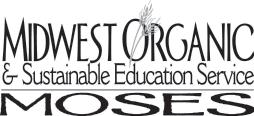
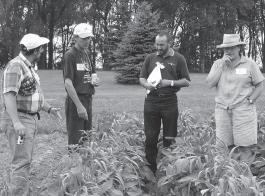
Organic Basics Trainings

Minars Organic Farmer of the Year
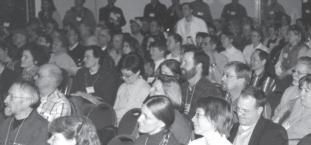
Organic Farming Conference
We are delighted to report that 2007 was a record-breaking year for MOSES, from the number of farmers reached through our outreach, education and training sessions, to another year of record attendance at the Organic Farming Conference. More and more farmers are being challenged to meet the rapidly growing consumer demand for organic food. MOSES is there to help educate new and conventional farmers on the benefi ts of organic and sustainable farming and help them make the transition. As the demand grows, so do the services that MOSES offers.
I would like to highlight two new programs MOSES is adding in 2008. The Organic Farmer Pilot Mentoring Program is matching experienced organic farmers with new and transitioning organic farmers. And the Organic Watershed Project is offering workshops in organic and sustainable row crop, forage and small grain production in the Mississippi River Watershed. Both programs are perfect complements to MOSES’ hugely successful Help Wanted: Organic Farmers program. For other new projects, see page 3.
MOSES is able to do these projects and so much more through the support it receives from so many generous individuals, foundations and companies. Organic and sustainable farming is having a profound and positive impact on the quality of the food we eat, the local availability of that food, and the economic health of our rural communities. We at MOSES are honored to have a role in making that happen. Faye Jones, MOSES Executive Director
Who We Are
The Midwest Organic and Sustainable Education Service, (MOSES) is a non-profi t 501(c)3 educationoutreach organization working to promote sustainable and organic agriculture.
MOSES serves farmers striving to produce high-quality, healthful food using organic and sustainable techniques. These farmers produce more than just food: they support thriving ecosystems and vibrant rural communities.
MOSES offers a variety of programs to assist farmers, agricultural educators, organizations and others requesting information. We organize events and provide resources and referrals to help people learn more about the growing opportunities in organic agriculture.
MOSES Board of Directors
December 2007
Barth Anderson Wedge Co-op, MN
Audrey Arner Moonstone Farm, MN
Chris Blanchard Rock Spring Farm, IA
Roger Blobaum Blobaum & Assoc., WA DC
Darlene Coehoorn Viewpoint Organic Acres, WI
Atina Diffl ey Gardens of Eagan, MN
Paul Dietmann WI DATCP, WI
Joyce Ford (President) Organic Independents, MN
Linda Halley Fairview Gardens/ Gardens of Eagan, MN
Margaret Smith Ash Grove Farm, IA
The MOSES Organic Farming Conference drew a record 2,250 attendees to La Crosse, WI in February for provocative education, engaging conversation, tantalizing food and stimulating inspiration, even with a 20 inch snowfall!
The Organic University® provided in-depth education to 405 participants through a set of nine day-long classes, ranging in topics from “Organic Hog Production” to “Transitioning to Organic Row Crops,” “Organic Dairy Production” and “Season Extension”.
The valuable Upper Midwest Organic Resource Directory was updated in the 7th edition and 8000 copies were distributed to farmers and others in the Midwest.
The MOSES website continues to be an excellent, up-to-date resource for farmers looking for information about organic farming transitioning and certification. In 2007, visits to the MOSES website averaged 540 a day. At the site, farmers and ag professionals can download information packets and find information about workshops and training sessions in their respective areas.
The Organic Broadcaster newspaper delivered important production, marketing and organic industry news to over 2,000 homes in six bimonthly issues.
MOSES and several project partners completed the stunning book Renewing the Countryside - Wisconsin.
Florence and Dave Minar of Cedar Grove Farm in New Prague, MN are honored with the 2007 MOSES Organic Farmer of the Year award.
Hundreds of information requests are fielded, resource packets sent and educational talks given through the Help Wanted: Organic Farmers campaign. Several “Organic Basics” workshops are presented to farmers, educating on-the-road in local communities on organic production and certification issues.
The MOSES Bookstore moves online, offering an expanded list of books through mail order, online and event sales, including an expanded booth at the conference.
The Midwest Organic Tree Fruit Producers Network has grown to over 300 participants and continues to offer unique education to this underserved community.
FY ending 8/31/07
Revenue Sources (Income)
Conference $349,439 Organic University $ 60,458 Broadcaster Newspaper $ 27,600 Fundraising/Gifting Letter $109,721 Sales $ 36,966 Grants/Agreements/Projects* $251,582 Misc $ 8,122 TOTAL REVENUE $843,888
Use of Funds (Expense) Conference $253,924 Organic University $ 53,903 Broadcaster Newspaper $ 22,575 Fundraising Expense $ 52,678 Cost of Sales $ 30,699 Grants/Projects* $146,394 Offi ce Overhead $145,727 Capital Expenses $ 35,729 TOTAL EXPENSES $741,629 Carryover** $102,259
This fi nancial report refl ects the 06-07 fi scal year, which ended on August 31, 2007. The rest of this 2007 annual report is for the 2007 calendar year.
*Grant funding supports many projects, including scholarships for the conference, Tree Fruit Network, Organic Basics Trainings, Resource Directory, Fact Sheets and Renewing the Countryside book project.
** A majority of the carryover funds are restricted funds for use in upcoming years.
MOSES is fi nancially supported in diverse ways. Sources include: individual donors 9%, foundations 15%, Federal grants 20%, sales 9%, conferences and events 45%, and miscellaneous income 2%.
MOSES is grateful for the varied support we
receive each year. Contributions enable us to provide high-quality organic education services to farmers and others. To donate to MOSES contact the offi ce or visit the website.
Organic Research Symposium
MOSES and project partner, the Organic Farming Research Foundation, are planning a 2.5 day symposium in conjunction with the 2008 Organic Farming Conference. The Symposium will bring current results, data and knowledge gained by over 30 researchers direct to farmers through presentations, small group discussions and printed abstracts. Funded by the USDA-CSREES- Integrated Organic Program.
Organic Watershed Project
Designed to increase organic row crop and forage production for livestock feed in the Upper Mississippi River watershed, this 18month project was started late in 2007. The project includes workshops, fi eld days and follow-up in WI, MN and IA.
Organic Farmer Pilot Mentoring Program
This one-year pilot project brings together 11 experienced organic farmers willing to act as mentors to 18 new or transitioning farmers. The project supports farm visits, regular communications and attendance to the Organic University.
Sustainable Ag in Western WI Partnership
In a unique partnership between MOSES, University of Wisconsin-River Falls and the Chippewa Valley Technical College, this broad project offers support for degree programs and curriculum development in sustainable farming systems. The project also includes a community education element.
Farm Bill and Government Policy
MOSES staff work with several partners, including the Sustainable Agriculture Coalition (SAC) to move forward a sustainable agriculture agenda and do education on the Farm Bill. Work has included facilitating educational meetings with farmers, offering electronic news briefs and the development of a political action section on the MOSES webpage.
Thank you again for coming to our county to present on organic vegetable production. Your presentations are always very engaging. The audiences with organic interests sure are fun groups. (Organic Basics partner) I love this conference, it is getting me fi red up to begin my process. I thought this class was great. (OU participant)
The combination of practical knowledge from farmers and the theory from researchers was good. This was a really great workshop. (OU participant) Thanks for your advice and encouragement. The process of application was enlightening and extremely benefi cial. I learned a lot and also felt a sincere appreciation for the organic seal. (Organic Basics attendee)
MOSES Mission Statement:
“To help agriculture make the transition to a sustainable organic system of farming that is ecologically sound, economically viable and socially just, through information, education, research, and integrating the broader community into this effort.”
Meet the MOSES Staff
Faye Jones is the Executive Director of MOSES and was the fi rst employee of the organization. She has worked in the organic world for 27 years as a market gardener, cut fl ower grower, event organizer and community volunteer. Jody Padgham Education Director and Financial Manager, started at MOSES in 2002. Jody oversees educational programs, including the Organic University, is the editor of the Organic Broadcaster Newspaper, and also acts as MOSES Finance Manager and develops a signifi cant portion of MOSES’ written educational materials. Cathy Olyphant is the MOSES Offi ce Manager and has been with the organization since 2003. Cathy manages our database and keeps offi ce operations functioning smoothly. Cathy is also the conference registration and sponsor coordinator and manages the Organic Broadcaster mailing list and advertisers. Harriet Behar joined the MOSES staff in July 2006 as the Outreach Coordinator. She is responsible for many of the activities in the MOSES Help Wanted: Organic Farmers campaign. Harriet has continued as the popular trainer for our series of farmer and ag professional trainings, and is the calm voice at the end of the “Organic Farmer Hotline.” Jessica Tupa joined the MOSES team in fall 2007 as Administrative Assistant. Jessica manages the MOSES bookstore, Resource Directory and the over 130 exhibitors at the conference. Eric Hatling, also joining the staff in fall 2007, is the Development and Communications Coordinator. Eric coordinates with media and is responsible for grantwriting and reporting. Krista Cleary helps out in the MOSES offi ce throughout the year, and in conference season is the Volunteer and Scholarship Coordinator. 4
Harriet Faye Jody Eric Krista Cathy Jessica


Midwest Organic & Sustainable Education Service
MOSES Board of Directors December 2006
The MOSES board consists of a majority of certified organic farmers and meets at least four times a year to provide governance to the organization.
Barth Anderson Wedge Co-op Minneapolis, MN
Audrey Arner Vice-President Moonstone Farm Montevideo, MN
Chris Blanchard Secretary Rock Spring Farm Highlandville, IA
Roger Blobaum Blobaum & Associates Washington, DC
Darlene Coehoorn Viewpoint Organic Acres Rosendale, WI
Paul Dietmann Treasurer
Sauk County Ag Extension Prairie du Sac, WI
Joyce Ford President Organic Independents Winona, MN
Linda Halley Fairview Gardens Goleta, CA
Margaret Smith Ash Grove Farm 111111 Hampton, IA
2006 Annual Report
MOSES has had another very successful year in 2006. The number of certified organic farmers, acreage of farmland in organic production and consumer demand for organic food continue to increase. This trend means more growth and opportunity for MOSES programs! The diversity and depth of our offerings are expanding, and we have hired two new staff members. Our annual report highlights our efforts and dedication to educating farmers and the community-at-large about organic and sustainable farming. We are honored to be a part of this growing community.
Faye Jones, MOSES Executive Director
WHO WE ARE
The Midwest Organic and Sustainable Education Service, (MOSES) is a non-profit 501(c)3 education-outreach organization working to promote sustainable and organic agriculture.
MOSES serves farmers striving to produce high-quality, healthful food using organic & sustainable techniques. These farmers produce more than just food: they support thriving ecosystems and vibrant rural communities.
MOSES offers a variety of programs to assist farmers, agricultural educators, organizations and individuals requesting information. We organize events and provide resources and referrals to help people learn more about the growing opportunities in organic agriculture.
MOSES Mission Statement:
PO Box 339 • Spring Valley, WI • 54767 715/772-3153 • fax 715/772-3162 info@mosesorganic.org • www.mosesorganic.org
MOSES Activities and Programs:
HELP WANTED: ORGANIC FARMERS Initiated in 2005, the “Help Wanted: Organic Farmers” campaign continues to support new and transitioning organic farmers throughout the Midwest. The campaign was stepped up in 2006 with the addition of staff member Harriet Behar as MOSES Outreach Director and the institution of a toll-free “Farmer Hotline” (888-551-GROW/4769). Harriet conducts regional trainings on organic production and certification, and is also available to answer specific questions from farmers calling the hotline. We’ve had hundreds of requests for information on transitioning to organic production since the inception of the Help Wanted Campaign.
Upper Midwest Organic Resource Directory The seventh edition of the Upper Midwest Organic Resource Directory was published in early 2006. Indispensable to organic farmers, agricultural educators and anyone interested in organics, this reference handbook lists resource groups, certification agencies, consultants, government agencies, suppliers, farmer coops, processors and publications in the Upper Midwest. Offered as a 70-page booklet from MOSES, the directory is also available on our website with live links or as a printable PDF. The web version of the directory is continually updated throughout the year.
Farmer of the Year Award The 4th annual MOSES Organic Farmer of the Year Award: An Organic Farmer Practicing Outstanding Land Stewardship was presented to Stan Schutte, Triple “S” Farms, at the 2006 UMOF Conference. Stan owns and manages a 200-acre diversified farm in central Illinois. Stan produces numerous vegetable crops, free-range poultry and beef, dent corn, sweetcorn, popcorn, soybeans and hard red wheat. Stan is a master of direct marketing and has been an inspiration and leader for both his local OCIA Certification chapter and the Farm Beginnings program in central Illinois.
MOSES website: www.mosesorganic.org We offer free downloadable educational materials, an updated events calendar, and links and information about our diverse opportunities and offerings on the MOSES website. Farmers and others can access organic fact sheets, our popular Upper Midwest Organic Resource Directory, the growing Upper Midwest Organic Tree Fruit Growers Network, and information about upcoming events and trainings. Instituted in late 2006 is a “Farm Bill ‘07” page that offers up-to-date information and opportunities for action to support organics in the upcoming Farm Bill.
MOSES Book Store MOSES offers over 20 books on organic farming available for purchase at events, through the mail or on the web. We also have “No Spray” farm signs. A printable order form for books and signs is available on the MOSES website or by calling the MOSES office.
Organic Dairy Farming Book Published in February 2006, the new book Organic Dairy Farming is a one-of-a-kind resource. A compilation of writings from 20 authors with expertise in their fields, the book was edited by Jody Padgham, MOSES Education Director, and published by Community Conservation, Inc. in partnership with MOSES. Designed to act as a resource for farmers new or transitioning to organic dairy production, the book has received favorable reviews and continues to sell well throughout the U.S.
Upper Midwest Organic Farming Conference The Upper Midwest Organic Farming Conference offers a stellar education and networking experience to evergrowing numbers of organic farmers and others. The largest organic conference in the U.S., in 2006 we hosted over 2200 people in La Crosse, Wisconsin, with 60 workshops, over 130 exhibitors and great organic food. Our list of Conference sponsors continues to grow, with over 40 supporting us in 2006.
Organic University The Organic University, held annually the day prior to the conference, is in its fifth year and continuesto provide well-received, comprehensive programming. Ten day-long sessions were attended by nearly 400 people in 2006. Organic University participants express great appreciation of the intensive sessions, small class size, presenter knowledge, and quality of discussion and training.


